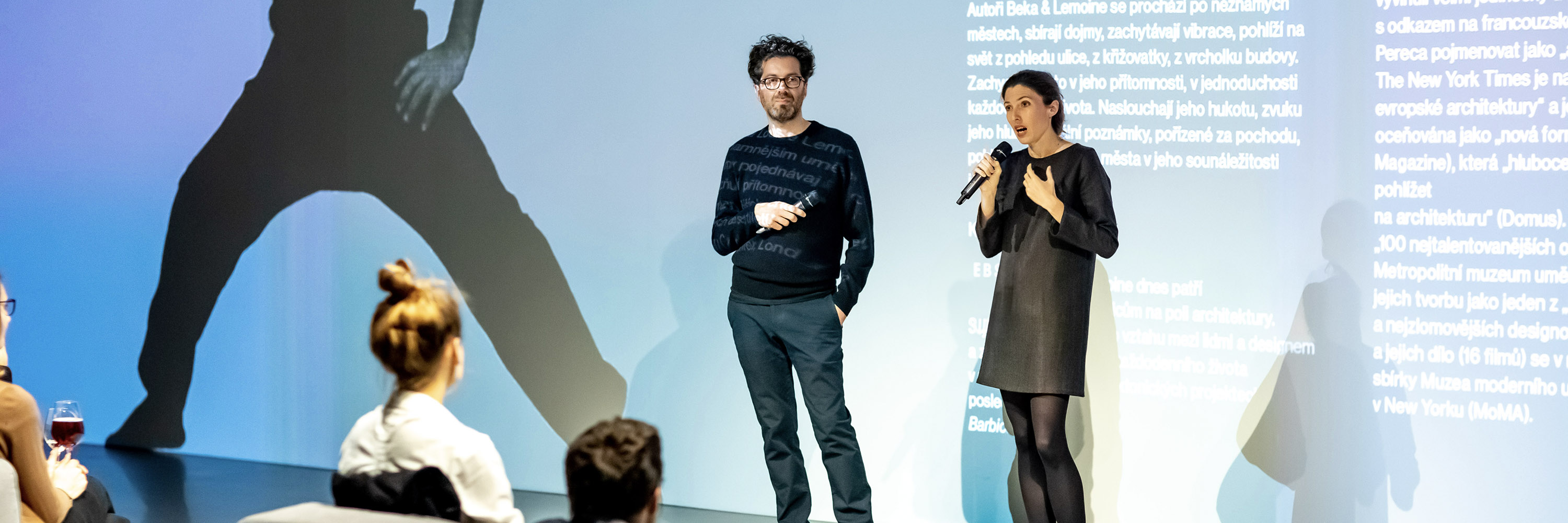SPACCASASSI
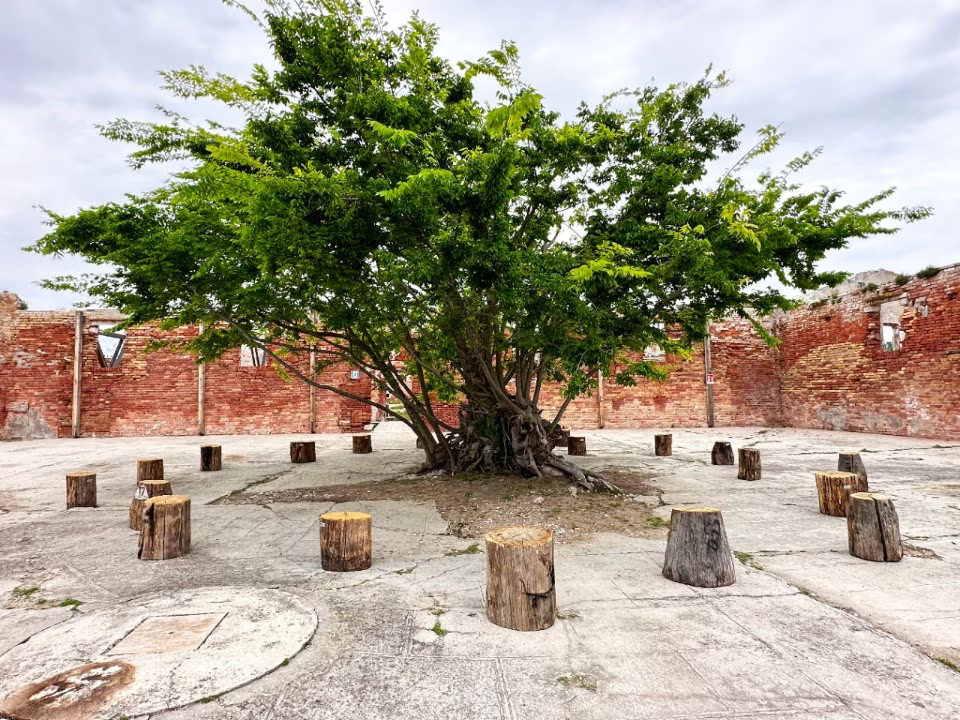
INSTALLATION
This installation tells the story of a tree that, on a wild island in the Venetian Lagoon, had the incredible force to break through the stones and flourish in the saltwater-soaked soil, growing into a thriving tree in the centre of a ruined medieval cloister and transforming that space into a temple for itself. This tree has become a living symbol of extreme strength and resistance, respected and revered by Venetians who have founded their identity on these very qualities. Its name is Celtis australis, but by everyone called Spaccasassi.
A series of performances will pay tribute to this tree, inviting the public to sit, observe and listen to this symbol of natural resistance.
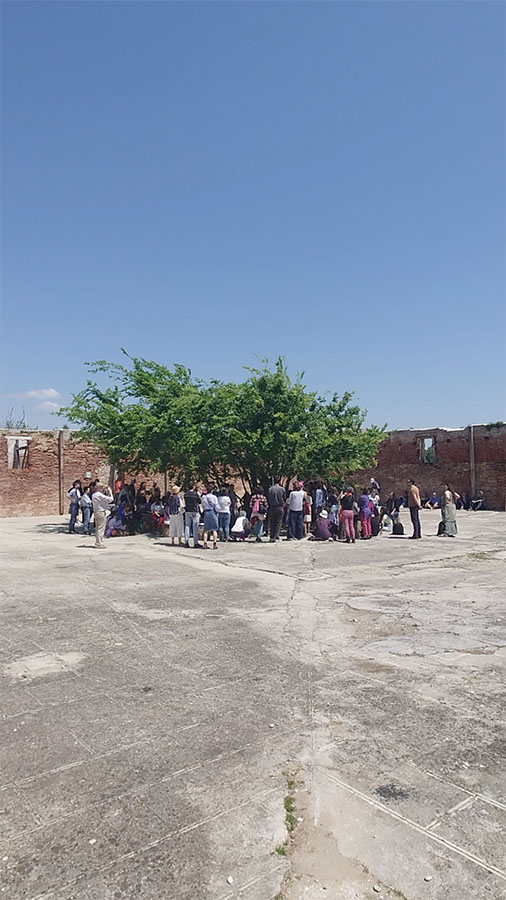
SPACCASASSI.
Creating a contemporary myth.
An installation by Beka & Lemoine in dialogue with Stefano Mancuso
With the collaboration of Teatro Stabile del Veneto – Teatro Nazionale
With technical sponsorship by Antico Trentino
Actors: Adriano Iurissevich, Giorgio Spiller
The project is located in the ruins of the cloister of the ancient monastery of La Certosa and its protagonist is a tree, a nettle tree, which has sprouted spontaneously thanks to the residual waters of the well that once served the structure. This tree species is locally called "rock-crusher" for its prerogative to make its way even through the hard surface of roads and architectures imposed by man on nature. Its essence is therefore that of a resistant being, which survives the most hostile conditions: both those directly created by man with his artifacts, and the climatic ones caused by his actions.
A series of performative activities pay tribute to this tree that has given rise to some kind of myth due to its resistance skills.
We are invited to sit, observe and listen to this symbol of natural resistance, with the attention we usually give to man-made works of art.
ACCADEMIA DI MENDRISIO
PUBLIC PROGRAM 2023
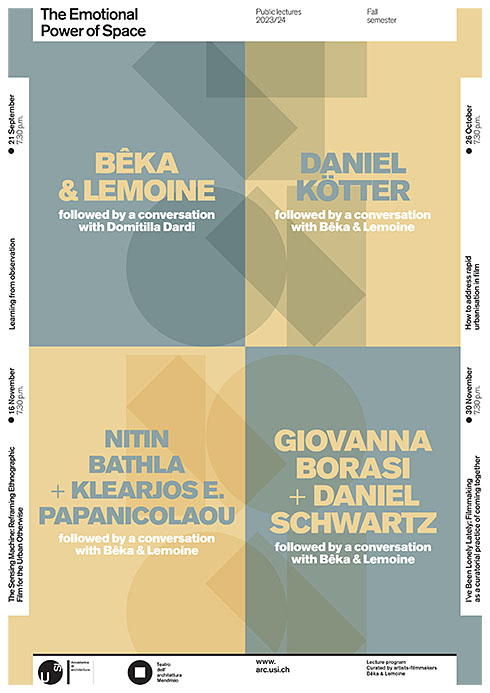
THE EMOTIONAL POWER OF SPACE
Curated by artists-filmmakers Bêka & Lemoine in close line with their own practice, « The Emotional Power of Space » is a series of talks that brings to the Academy of Architecture in Mendrisio filmmakers who share a common sensitivity and anthropological approach in the way they bring attention to the relationships between people and their living environment. These talks will present their respective approaches and methodologies and their way of using cinema as a critical tool of observation of the social consequences of rapid urban transformations taking place in different part of the world.

Bêka & Lemoine - Lecture
Thursday 21 September 2023
Teatro dell'architettura Mendrisio
Through a selection of recent projects including films and books, Bêka & Lemoine will present the long-term, multi-facet and unconventional research they have been developing over the years at the crossroads of non-fiction cinema, video art and social sciences. Putting forward the question of experience in the way we collectively relate to space, their work questions the role and impact of architecture, and the built environment at large, from an anthropological point of view.
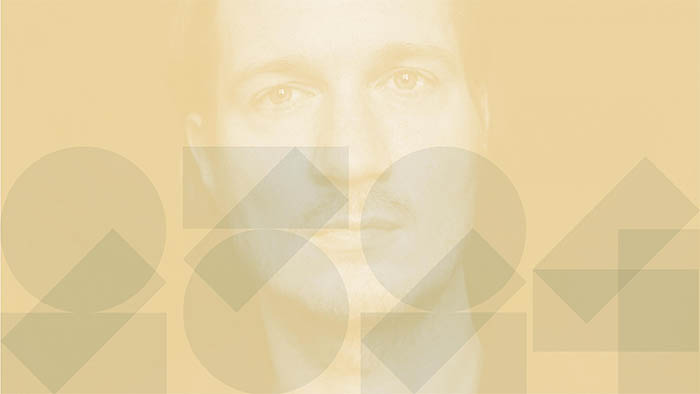
Daniel Kötter - Lecture
Thursday 26 October 2023
Teatro dell'architettura Mendrisio
Geography, social strata, the built environment, political interests and ethnically constructed fault lines are all superimposed layers that contribute to the separations, segregations and ruptures created in urbanised societies. So filming the processes of urbanisation calls for an analysis of the space and time of the given locations, as well as a reflection on the positioning of the camera and the filmmaker himself. Based on his Urban Trilogy (Desert View, Hashti Tehran and Rift Finfinee), filmmaker and artist Daniel Kötter will take a critical look at his own methodology, seen as a practice that links art, ethnography and urbanism. How could film potentially contribute to an allegorical approach to the space in which we want to live?
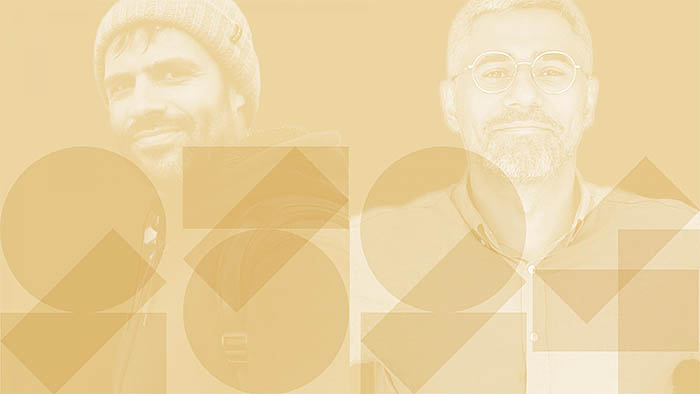
Nitin Bathla + Klearjos Eduardo Papanicolaou - Lecture
Thursday 16 November 2023
Teatro dell'architettura Mendrisio
Over 100 years ago, anthropologist-filmmakers harnessed the power of nascent ‘cinema’ practices to narrate stories about the faraway, exotic ‘Other’, resulting in the first ethnographic films. Today, contemporary ethnographic filmmaking has been re-formulated to articulate critical, affective and sensory narratives of entangled subjectivities and contested environments. This talk will explore the legacies and futures of ethnographic filmmaking in urban environments, focusing on how architects and built environment professionals can deploy this genre of filmmaking to narrate the urban otherwise.
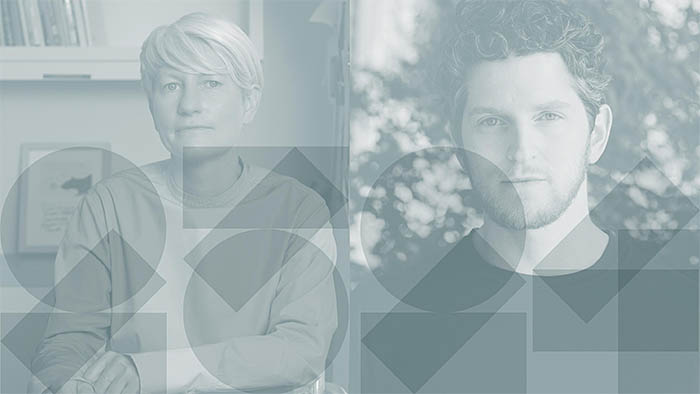
Giovanna Borasi + Daniel Schwartz - Lecture
Thursday 30 November 2023
Teatro dell'architettura Mendrisio
Giovanna Borasi and Daniel Schwartz will present an overview of their work together making a three-part documentary film series and investigation, produced by the Canadian Centre for Architecture. Each film looked at challenges to urban society, changes in lifestyles and shifting demographic pressures, and highlighted architectural projects trying to imagine new spatial configurations. While discussing the topics of each film - homelessness, solo-living, and aging - Borasi and Schwartz will also share their filmmaking process, curatorial vision, and lingering questions: What role can documentaries play in cultural and research institutions? How do films differ from exhibitions and publications? And what happens when filmmakers and architectural professionals make things together.
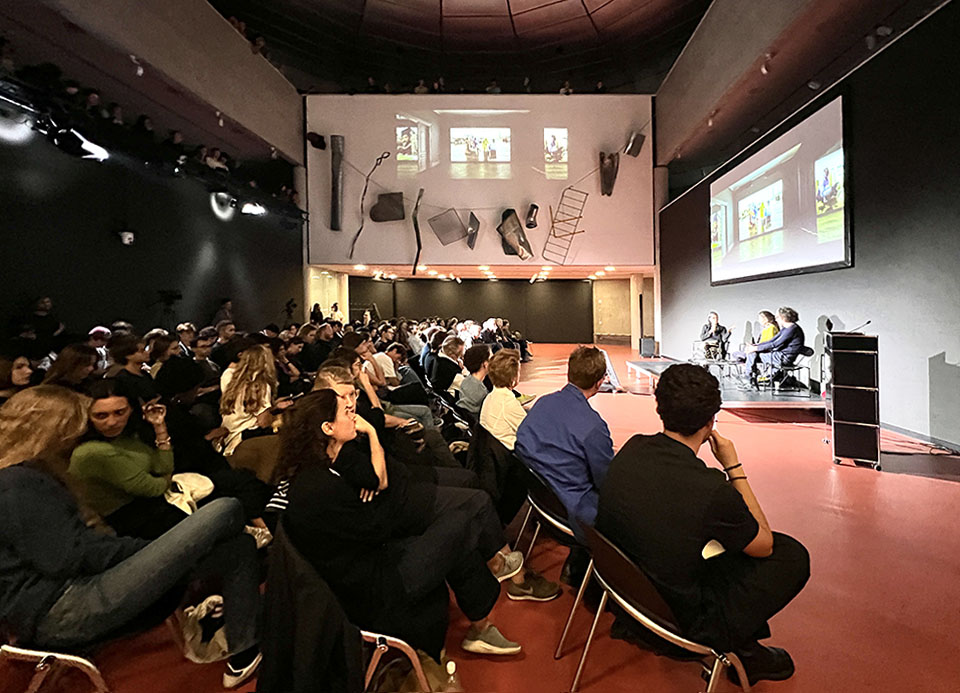
SENSITIVE OBSERVATION
SEMINAR SERIES - AA LONDON
The "Sensitive Observation Seminar Series" organized by Ila Bêka, Louise Lemoine and Gili Merin within their Diploma unit at the AA School of Architecture in London 2020/2021, will host during the year a series of guests from different fields - architects, filmmakers, photographers, artists, philosophers, writers, anthropologists and other outsiders of "categories" - who will discuss their own practice, research and working methodology.
In close relation to the unit's studio work and production of films, the seminar will attempt to define what sensitive observation means in order to enlighten the social, political and poetical importance of such practices within architectural education and our profession at large.
1. THOMAS DANIELL
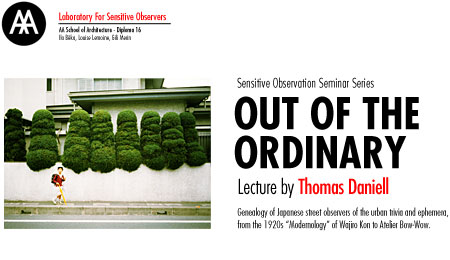
In perfect line with the seminar's intention to define what can be sensitive observation in the urban, Thomas Daniell presents a historical overview of the genealogy of Japanese street observers from the 1920s "Modernology" of architect Wajirō Kon, to the 1970s "Thomasson" objects of artist Genpei Akasegawa, the 1980s "Street Observation" of the ROJO group, and the 1990s "Pet Architecture" of Atelier Bow-Wow.
Thomas Daniell is Professor of Architectural History, Theory and Criticism at Kyoto University Japan. A frequent contributor to AA Files, his most recent book is An Anatomy of Influence (AA Publications, 2018).
Watch this Lecture
2. EMANUELE COCCIA
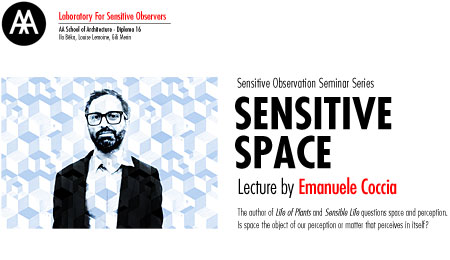
The author of "Life of Plants," "Metamorphosis" and "Sensible Life" questions space and perception: is space the object of our perception or matter that perceives in itself?
"We usually imagine space as the object of perception: extended and inanimate matter that the five senses allow us to transform into experience. Instead, I would like to try to demonstrate that what we call space is an immense sensorium that does not wait for our senses to open up to transform the world into experience. The whole space feels and all that it feels lives spatially".
Emanuele Coccia is Associate Professor of Philosophy at the Ecole des Hautes Etudes en Sciences Sociales in Paris, and formerly taught in Freiburg im Breisgau, Germany, Columbia University in New York, and the Universities of Buenos Aires, Dusseldorf, Tokyo and Weimar.
Watch this Lecture
3. CAMILLE BUI

Cinema was born at the turn of the 20th century, as did the modern metropolis. Since then, it has been a privileged observer of the urban phenomenon. In this lecture, Camille Bui intends to show how urban documentary filmmaking evolved from a plastic translation of the rhythm of big cities by the avant-garde in the 1920s, to the lived encounter with city dwellers and the listening of their voices by direct cinema filmmakers since the 1960s and until today.
Camille Bui is Associate Professor in Film Studies at University Paris 1 Panthéon-Sorbonne. In 2018, she published the book: Cinepractices of the City. Documentary and Urbanity after Chronicle of a Summer (Presses Universitaires de Provence).
Watch this Lecture
4. WANG BING
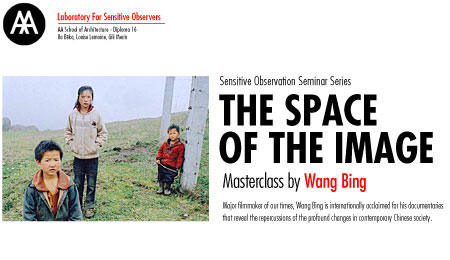
Major filmmaker of our times, Wang Bing is internationally acclaimed for his documentaries that show the downsides and indirect repercussions of the rapid and profound changes in contemporary Chinese society.
Through excerpts of some of his most well-known films ("West of the tracks", "The Three Sisters", "The Ditch" and "Man with No Name"), Wang Bing will look back on 20 years of intense and radical artistic commitment, discussing his working methodology and specific understanding of documentary filmmaking.
Through patient attention and subtle listening to the slightest gesture and inflection of body language, Wang Bing's cinema plunges us as close as possible in the daily intimacy of anonymous people, in fragile and precarious situations, usually invisible and left out of the scope of official representation.
Watch this Lecture
5. FRANCESCO CARERI
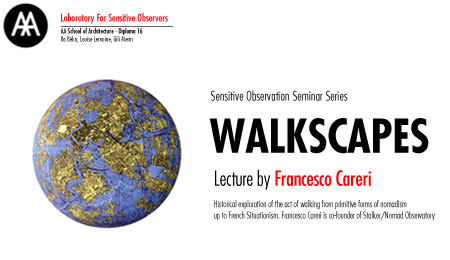
Historical exploration of the act of walking from primitive forms of nomadism up to French Situationism.
Francesco Careri is co-founder of Stalker/Nomad Observatory
Francesco Careri is an Associate Professor of Urban and Architectural Design at Roma Tre University where he is co-director of Master Environmental Humanities and Master Performing Arts and Communitarian Spaces. He is co-founder of Stalker, with which since 1995 he experiments actions and research in the multicultural city. Since 2006 he runs the Civic Arts, a peripatetic laboratory grounded in walking explorations of emerging phenomena.
He is currently scientific co-responsible together with Giovanni Caudo, of the Laboratorio di Città Corviale and together with Fabrizio Finucci of LaboratorioCIRCO. He published Constant. New Babylon, una Città Nomade, Testo & Immagine 2001; Walkscapes. Walking as an Aesthetic Practice, Editorial Gustavo Gili 2002, Culicidade 2016; Pasear, detenerse, Gustavo Gili 2016, and with Lorenzo Romito, Stalker/Campus Rom, Altrimedia 2017.
Watch this Lecture
6. GILLES CLÉMENT
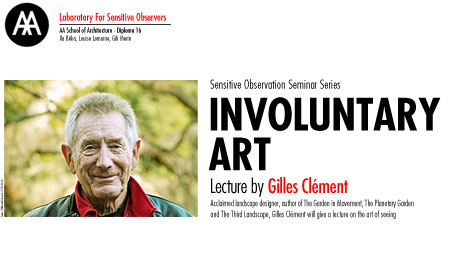
Acclaimed landscape designer, author of The Garden in Movement, The Planetary Garden and The Third Landscape, Gilles Clément gives a lecture on the art of seeing.
In search of wonder and visual surprises along his numerous travels around the world, Gilles Clément published in Traité succinct de l'art involontaire (Sens et Tonka, France, 2014) his collection of photographs and drawings depicting fragile situations, subtle circumstances, and ephemeral traces of interactions between man and nature. These unintentional and anonymous poetical moments is what he calls « involuntary art ».
Landscape designer, writer and educator, Gilles Clément's work has reached international recognition for a great number of gardens among which: Parc André Citroën in Paris (1992), Parc Henri Matisse in Lille (2003), the Gardens of the Musée du Quai Branly in Paris (2003), the Gardens of the Domaine du Rayol in the Var region in France. He has also developed important theoretical research. His main publications include: « The Garden in Movement » (1991), « The Planetary Garden » (1999) and « The Third Landscape » (2004).
Watch this Lecture
7. UGO LA PIETRA
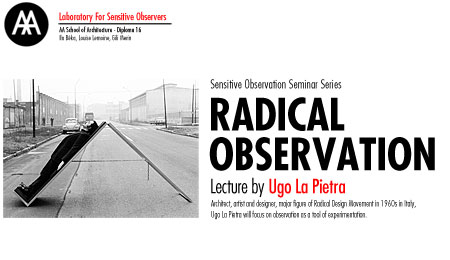
Architect, artist and designer, Ugo La Pietra is a major figure of the Italian radical design movement of the 1960'. His work defies all categories as he spent his life fighting against partition between disciplines, exploring a wide range of formal expressions and artistic languages.
Using photography, film, drawings, cartographies, and other « decoding tools », his practice aims to break behavioural habits and equilibriums in order to establish a new relationship between the individual and the urban environment, based on a process of appropriation that he calls « Inhabiting the city ».
Watch this Lecture

